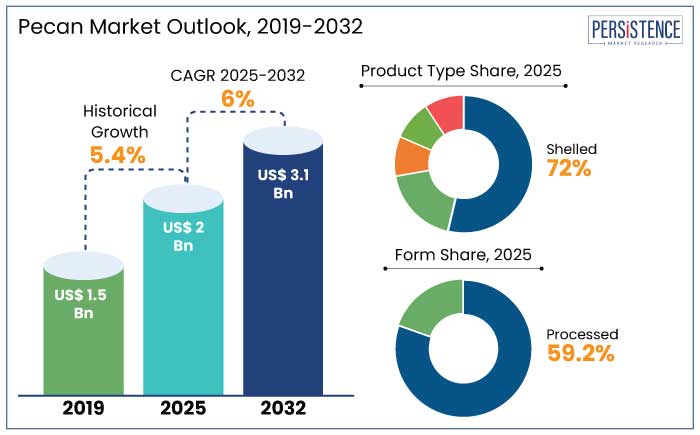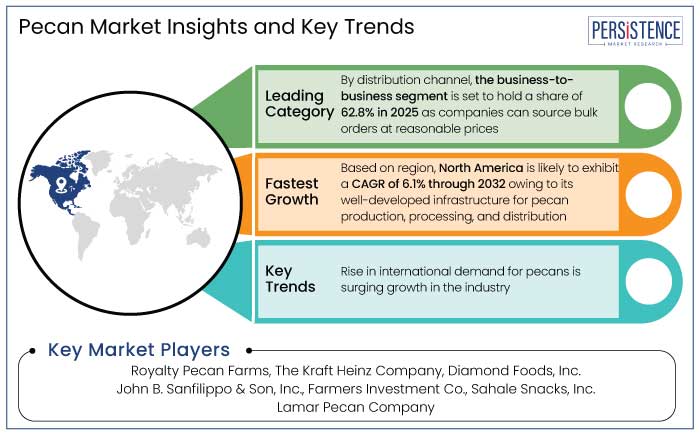Industry: Food and Beverages
Published Date: January-2025
Format: PPT*, PDF, EXCEL
Delivery Timelines: Contact Sales
Number of Pages: 187
Report ID: PMRREP12652
The global pecan market is predicted to reach a size of US$ 2 Bn by 2025. It is anticipated to showcase a CAGR of 6% during the forecast period to attain a value of US$ 3.1 Bn by 2032.
As consumers become more health-conscious, they seek out nutrient-dense snacks like pecans, which are rich in antioxidants, healthy fats, and dietary fiber. A 2023 study revealed that 53% of U.S. consumers preferred snacks that were healthy, and pecans, being a natural and nutritious choice, fit perfectly into this demand.
Pecans are increasingly being incorporated into vegan and plant-based food products as the plant-based diet trend continues to gain momentum. Its popularity in the vegan market is growing, especially as an ingredient in plant-based snacks. The nut is estimated to hold a share ranging between 10% to 12% in vegan friendly snacks by 2028.
As consumers become environmentally conscious, they are posing a demand for sustainable and eco-friendly packaging. Brands are therefore shifting to premium, recyclable, or biodegradable packaging to meet this need. More than 30% of pecan producers are estimated to adopt recyclable and biodegradable packaging by 2030 to appeal to environmentally conscious consumers

Key Highlights of the Industry
|
Market Attributes |
Key Insights |
|
Pecan Market Size (2025E) |
US$ 2 Bn |
|
Projected Market Value (2032F) |
US$ 3.1 Bn |
|
Global Market Growth Rate (CAGR 2025 to 2032) |
6% |
|
Historical Market Growth Rate (CAGR 2019 to 2023) |
5.4% |
The market in North America is predicted to hold a share of 58% in 2025. The U.S. is the largest producer of pecans globally, accounting for 80% of the world’s supply. This dominance in production ensures a steady supply and market control in the region.
Pecans are widely consumed in North America, driven by their use in traditional dishes like pecan pie as well as their incorporation in snacks, baked goods, and health foods. For instance,
As consumers increasingly prioritize healthful eating, demand for nutrient-dense nuts like pecans has surged. Growing adoption of plant-based diets has further boosted the market as a source of protein and healthy fats.
North America boasts a well-developed infrastructure for pecan production, processing, and distribution. The U.S. pecan industry has successfully expanded its global reach. For instance, exports to China have grown significantly, despite trade challenges in recent years.
The shelled segment is anticipated to hold a share of 72% in 2025. Shelled pecans are ready to use, making these more appealing to consumers and industries compared to in-shell pecans, which require additional effort to crack and clean. This convenience caters to busy consumers and food manufacturers who prioritize time-saving solutions.
The significant difference reflects higher demand for shelled pecans in both domestic and international markets. Shelled pecans are often marketed as a healthy, ready-to-eat snack, appealing to consumers focused on convenience and nutrition.
Their versatility in plant-based diets and recipes further enhances their popularity. Retailers and online platforms predominantly sell shelled pecans in consumer-friendly packaging. The rise of e-commerce has further boosted the demand for pre-packaged, shelled pecans.
The processed segment is projected to hold a share of 59.2% in 2025. Processed pecans, including roasted, salted, flavored, chopped, or coated varieties offer ease of use and immediate consumption, thereby making them more appealing. These products cater to busy lifestyles, where convenience and ready-to-eat formats are highly valued.
Processed pecans are extensively used in products like candies, pralines, and baked goods. Roasted and flavored pecans are popular as stand-alone snacks or in nut mixes. These command a premium price compared to raw/whole pecans due to the added labor, flavoring, and packaging involved. This value addition increases profitability for producers as well as retailers.
Processed pecans are marketed as healthy snacks, often enhanced with flavors or nutritional coatings like protein or vitamins. They usually cater to plant-based consumers, offering versatile options for various dishes and snacks. Processed pecans have broader appeal in international markets where consumers prefer ready-to-use or enhanced food products over raw ingredients.
Business to business is projected to hold a share of 62.8% in 2025. In 2023, the B2B segment accounted for nearly 68% of the global pecan market revenue, significantly surpassing the Business-to-Consumer (B2C) segment. Businesses purchase pecans in bulk to decrease procurement costs and ensure a steady supply, especially during peak production seasons.
International food and beverage companies source pecans in large quantities, driving the B2B segment's dominance in exports. For example,
The B2B segment ensures year-round demand due to production schedules in food manufacturing and other industries, unlike the B2C segment, which can be influenced by seasonal trends.
Processed pecans dominate the B2B market as they are more convenient for industrial applications. Businesses prefer shelled, roasted, or chopped pecans for direct incorporation into products. Processed pecans accounted for nearly 60% of the total market revenue in 2023, much of which is attributed to B2B transactions.
Potential growth in the global pecan industry is predicted to be driven by innovations like chocolate-coated, spiced, or honey-roasted pecans. Growing pecan consumption in Asia Pacific and Europe offers lucrative opportunities for exporters.
Rising awareness of pecans' health benefits like being rich in antioxidants, healthy fats, and essential nutrients are set to drive demand. Pecan products marketed as non-GMO, gluten-free, and high-protein snacks will gain traction, especially among health-conscious consumers.

The pecan market growth was considerable at a CAGR of 5.4% during the historical period. Growth during this period was attributed to rising demand for healthy snacks and plant-based diets. Despite disruptions caused by the COVID-19 pandemic, the market witnessed a moderate growth as consumers worldwide shifted toward health-focused eating habits.
Pecans gained popularity as a nutrient-rich nut and found applications in snacks, baked goods, confectionery, and vegan recipes. The growing demand for roasted, flavored, and value-added pecans accelerated growth in the processed segment during the historical period. Producers adopted eco-friendly farming practices and improved supply chain transparency to attract environmentally conscious consumers.
Growth during the forecast period is estimated to be driven by increasing demand for processed pecans, rising exports, and surging applications in vegan and health-focused food products. Sales through online channels are anticipated to spike owing to increasing consumer reliance on digital platforms.
Innovations in Packaging to Bolster Demand Worldwide
There is a growing shift toward using recyclable, biodegradable, and compostable packaging materials as sustainability becomes a prominent focus for companies as well as consumers. Companies are adopting eco-friendly packaging solutions to appeal to environmentally conscious consumers. The industry is witnessing an increasing consumer preference for packaging that minimizes environmental impact. For instance,
Recyclable materials like paper, cardboard and biodegradable plastics are becoming common in the pecan market. Plant-based packaging, including mushroom packaging or seaweed-based films, is gaining popularity in the food industry as a biodegradable alternative to plastic.
Pecan producers can differentiate their brands by adopting these materials and prominently displaying their sustainability efforts on packaging. This aligns with growing consumer demand for products with reduced environmental footprints.
Modern consumers prefer minimalistic and transparent packaging that enables them to see the product inside. This trend is driven by the desire for simplicity, freshness, and the perception of higher quality. As consumers increasingly seek on-the-go snack options, portion-controlled and resealable packaging has become a major trend. Small and single-serve packs are especially popular with busy consumers.
Sustainable Farming Practices and Transparency to Attract Consumers
Water conservation is a key focus for the pecan industry due to the high water requirements for growing pecans. Innovations in water-efficient irrigation systems, such as drip irrigation and moisture sensors, are being adopted to reduce water waste and improve water management. Pecan farming in regions like U.S. Southwest has started to adopt drip irrigation systems to decrease water consumption and increase efficiency.
Drip irrigation systems deliver water directly to the plant's roots, reducing water usage by 30% to 50% compared to traditional flood irrigation methods. Moisture sensors and weather-based irrigation controllers are being integrated to optimize irrigation schedules and further minimize water waste. With rising consumer demand for organic products, more pecan farmers are adopting organic farming practices, including the elimination of synthetic pesticides, fertilizers, and herbicides.
Organic certification not only meets consumer demand for cleaner, chemical-free products but also enhances soil health and biodiversity. A survey revealed that 38% of consumers are more likely to purchase products from companies that are transparent about their ethical sourcing and labor practices.
Supply Chain and Labor Issues May Hinder Demand
The pecan harvesting season generally peaks in the fall and early winter, requiring large numbers of seasonal workers to ensure timely collection and processing of the nuts. A shortage of available workers during this critical period can result in delays in harvesting, leading to a loss of crop quality. Overripe or under-ripe nuts can affect the marketability and pricing of pecans.
A significant portion of agricultural labor in the U.S., particularly in pecan-producing states like Georgia, Texas, and New Mexico, comes from migrant workers. Immigration policies and restrictions on migrant labor have led to difficulties in filling seasonal positions in orchards and processing plants. For instance,
Companies to Capitalize on Organic and Non-GMO Trends
Consumers are increasingly prioritizing organic products, including pecans, which are a staple in the healthy snack market. For example,
Pecan producers can capitalize on this growth by offering certified organic products. Organic certification from trusted organizations like USDA Organic ensures that products meet rigorous standards and appeal to consumers who are willing to pay a premium for organic food. As concerns over the potential risks of genetically modified organisms (GMOs) continue to grow, there has been a significant shift toward non-GMO products.
Non-GMO foods are therefore witnessing increasing demand, and pecans are no exception to this trend. For instance,
Organic pecans typically command a price premium of 20% to 30% over conventional pecans due to their higher production costs. Despite the price increase, organic products continue to attract loyal consumers who value quality and sustainability.
Brands to Leverage E-commerce Channels to Gain Profit
The food and beverage e-commerce market is witnessing skyrocketing growth as consumer preferences shift toward the convenience of online shopping. Consumers are increasingly seeking direct-to-consumer (D2C) options, which offer a wider selection, better prices, and the convenience of home delivery. Consumers are increasingly willing to buy premium and niche products, such as organic or non-GMO pecans, through e-commerce channels, as they trust online retailers for product variety, pricing, and convenience. For instance,
Subscription boxes for nuts, including pecans, are appealing to consumers who want to try different varieties or enjoy regular deliveries of their favorite products. A survey revealed that 60% of millennials are more likely to sign up for a subscription service that provides healthy and natural snacks like pecans, making it an attractive option for younger generations.
Companies in the pecan market are developing unique pecan-based products like pecan oil, pecan butter, flavored pecans, and pecan snacks. They are catering to health-conscious consumers by offering organic and non-GMO pecans.
Businesses are highlighting the origin, sustainability practices, and family-owned traditions to build emotional connections with consumers. They are progressively using platforms like Instagram and TikTok to promote recipes and uses for pecans.
Brands are also partnering with chefs, influencers, and food bloggers to increase visibility. They are implementing water conservation, integrated pest management, and other sustainable farming practices. Organizations are ensuring traceability to attract ethically conscious buyers. They are expanding in markets with rising demand for the nut.
Recent Industry Developments
|
Attributes |
Detail |
|
Forecast Period |
2025 to 2032 |
|
Historical Data Available for |
2019 to 2023 |
|
Market Analysis |
US$ Billion for Value |
|
Key Regions Covered |
|
|
Key Market Segments Covered |
|
|
Key Companies Profiled in the Report |
|
|
Report Coverage |
|
|
Customization and Pricing |
Available upon request |
By Product Type
By Form
By End Use
By Distribution Channel
By Region
To know more about delivery timeline for this report Contact Sales

The market is anticipated to reach a value of US$ 3.1 Bn by 2032.
The U.S. is the biggest consumer of pecans.
Mexico and Canada are the leading importers of pecans.
Prominent players in the market include Royalty Pecan Farms, The Kraft Heinz Company, and Diamond Foods, Inc.
The market is predicted to witness a CAGR of 6% throughout the forecast period.